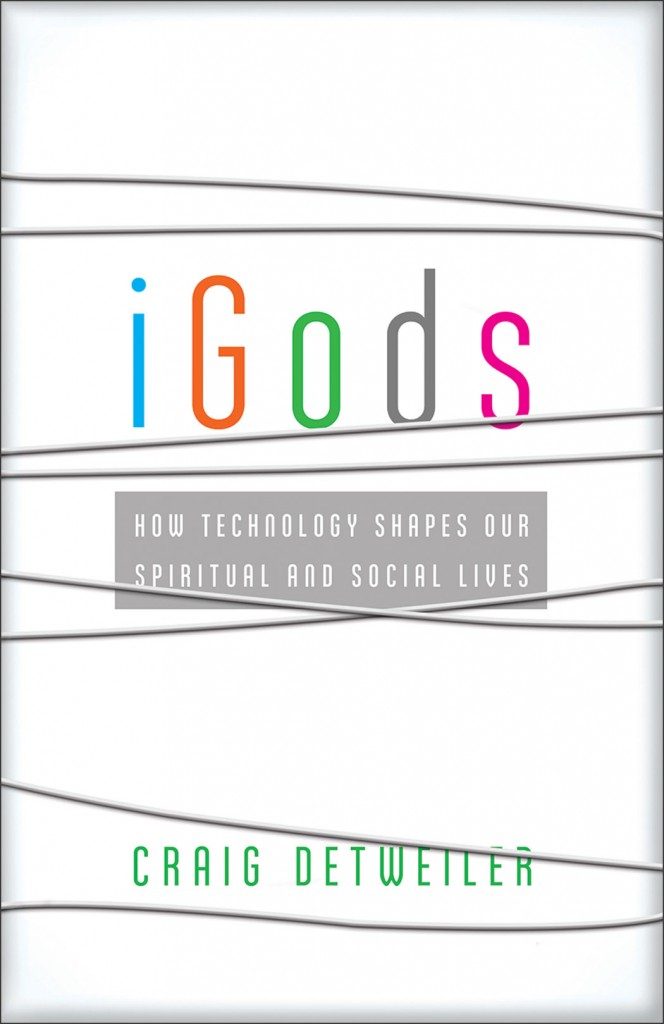We live in an amazing day of technological wonders. Personal computers, the Internet, smart phones and tablets have all contributed to the marvels that help us manage our days. But, as Neil Postman warned us in Technopoly (1992), for every upside we gain from technology, there is a potential downside. Unintended consequences can, over time, take us by surprise if we are not on guard. These consequences can have profound impacts on our walk with God and our relationships with others.
Craig Detweiler adds his voice to Postman’s, marveling at the technology of our day, in his new book, iGods: How Technology Shapes Our Spiritual and Social Lives (2013). In this book he celebrates the benefits of technology as well as identifies some of its latent dangers. He provides both a thought-provoking analysis as well as a needed warning:
“This book is about how technologies entertain and enthrall us. We are tethered to our mobile devices. They comfort us when we’re lonely, reassure us when we’re lost, organize us when we’re feeling out of control. They are an electronic security blanket, a way for families and friends to feel close despite the distances that may separate us. They offer an easy way to pass the time between things, when we are waiting for something to start or someone to show up. We can sink into our cell phone when we are bored, when we are scared, or when we are eager to share some great news. However, delight can devolve into devotion” (13 of 290).
I was first drawn to this book when I looked through the table of contents. Topics include Apple, Amazon, Google Facebook, YouTube, Twitter and Instagram—companies that impact my life daily. These are the technical giants who have risen to prominence by helping us manage, respond and contribute to the vast abundance of information that floods our lives daily through the Internet.
Detweiler goes beyond providing just a brief history of these companies, their founders and the technologies they have introduced. He examines their passion and vision. What are they trying to accomplish? How did they become successful? And (most intriguing) how have their philosophies seeped into our own worldview to shape the way we interact and engage with the world around us?
Craig Detweiler is a film writer and Professor of Communications and Director of the Center for Entertainment, Media and Culture at Pepperdine University in Malibu, CA. His PhD is from Fuller Seminary. While I don’t agree with all of his conclusions in the book or follow all the connections he makes between technology and spirituality, he is to be commended for calling us to examine closely the technology we bring into our lives.
The technology we depend on every day is pervasive. It has become more than tools in our hands that we use to shape our world. It now shapes us. It profoundly impacts our relationships and how we perceive and respond to the world around us, often in ways that are not healthy. Here are four impacts of technology gleaned from Detweiler’s book that we must resist:
It is making us a more impatient people.
We have become use to having instant answers and immediate results catered to our interests and felt needs. God often delights in taking time to accomplish His purposes, but we have become unwilling to wait, frustrated when we think something is taking too much time. We have questions, but are often more prone to turn to Google than to take time to ponder, think, remember or even pray. Many treat churches like webpages or personal shopping carts. Instead of serving others, we come to be served. Detweiler asks: “What are the implications of personalized shopping for faith communities? We are so accustomed to Amazon catering to our interests that we began to evaluate congregations based upon what they could do for us” (107 of 290). We show up for awhile, look around for what interests us. But if we get bored or offended, we are off to the next page. We don’t stick around to work through problems, seek reconciliation and really grow deep in our relationships with God and others.
It is making us a more restless people.
We stay connected 24/7, always checking in on our devices, not wanting to miss out on the endless stream of emails and news feeds pouring into our lives. We sacrifice privacy for connection and choose access over solitude. We turn to our phones and devices more often than to those around us or to God. Our hunger for information and our need not to be left out is endless. We are endanger of losing the notion of rest and Sabbath. We need time to unplug and get away from the relentless tap of news and information.
It is making us a more self-centered people.
Our technology has set out to place us in command of our world, placing everything at our fingertips. It is so well packaged and so prevalent that we have become oblivious to our dependance upon it. We are deluded into thinking we are somehow self-sufficient and in control. It has given us a false illusion that “I” am what is most important in the universe. Detweiler comments:
“The iMac begat the iPhone and the iPad, and each one starts with me—or rather ‘I.’ They enhance our ability to connect and to serve, but they can also create an inflated sense of self, believing the entire world revolves around ‘me”: iVoice, iWant, iNeed” (14 of 290).
We promote ourselves rather than share our hearts. We put positive spins on our lives so others can “like” what we say. We are endanger of turning our technology and ourselves into an iDol.
It has made us a more distracted people.
Ironically our devises that are designed to help us cope and connect us to the world have had the opposite effect, at least in real life.
“Devices designed to organize our schedules have made us busier than ever. Families have fragmented along technological lines. Nights that use to be spent gathered around the fire gave way to the radio and television, before splintering into individual screens. We inhabit the same space, but follow our own feeds. We have an iPhone in our hand and buds in our ears. How can we hear God (or each other) amid the din?” (42 of 290).
We are endanger of losing our ability to stay focused and attentive. We too easily miss opportunities for engagement around us because our eyes are down and not up. We are tied to a screen and less aware of what is going on around us. Detweiler concludes: “We are hyperconnected and easily distracted, always available and rarely present” (16 of 290).
iGods underscores the need for Christians and churches to think seriously and theologically about technology. Technology is a gift of God, but we must use it wisely and intentionally for His glory and our good.
“In an era of too much information, the need for discernment and wisdom will be greater than ever. Consider this book an active resistance to a thoughtless embrace. I want to awaken our senses, to make room for thought, for contemplation, for beauty, for God. How might Christians recover these ancient and timeless virtues in a wired era?” (28 of 290).





















